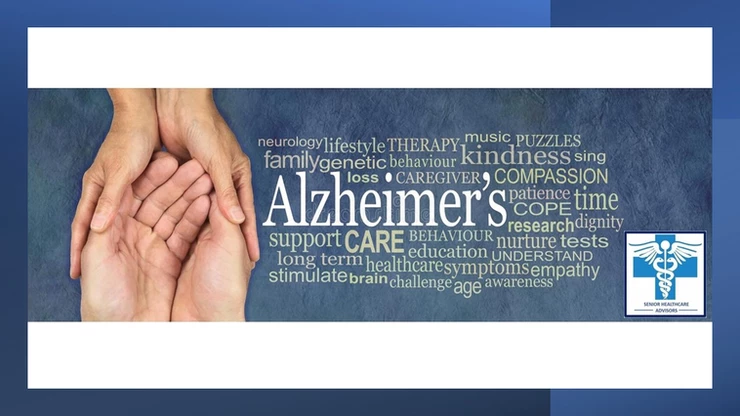Caretakers Coping with a Loved-One’s Alzheimer’s Disease
Health News from Senior Healthcare Advisors
If you are caring for a loved-one who is suffering from Alzheimer’s disease (AD), you may be facing some difficult challenges as you try to understand behavior changes and provide care for your loved one. Understanding the actions of a person with Alzheimers Disease can help to lessen these struggles.
People with AD May Exhibit the Following Behaviors:
- Intense anxiety about everyday life, which may be exhibited by frequently repeating information and asking questions about things they were once familiar with.
- Writing notes to themselves over and over to remind them of things that were once easily remembered.
- Lack of drive about daily or routine tasks, which are now very overwhelming. For instance your loved one may have loved to do crossword puzzles their entire life but now sees them as too overwhelming.
- Your loved one may become frequently and easily agitated as they become less able to navigate their environment and express or control their feelings. For instance, they may lash out at you when you are trying to help.
Coping Techniques
The following techniques may help you cope with caring for someone with AD:
- Set realistic and reachable goals. Caregivers often try to make everything just right for their loved-one and end up exhausted from trying to meet unrealistic goals. Perhaps your goal is for your loved one to be comfortable, clean, and well-fed. If you accept conquering 75% success, you will have more time to enjoy with them that you would have spent fretting over not reaching your goals.
- Anticipate misunderstandings. People suffering with AD may become unable to interpret verbal and non-verbal cues accurately. That, in-turn, can cause frustration and anxiety for you and your loved one. Try to communicate clearly and concisely. When you repeat something, use the same words. Lower any background distractions and noise, and use names rather than pronouns, as they can be confusing to a person with AD.
- Keep in mind that each behavior has a purpose. According to an article by The University of California (2022), many of the behaviors exhibited by AD patients, such as striking out or shouting, have meaning. While the person with AD doesn’t want to hurt anyone intentionally, they are trying to communicate something that they no longer can express verbally. Try to slow down and look at the world through their eyes and then react to the feelings behind the behavior, rather than just the behavior, and an emotional crisis can be averted.
- Make the most out of the good times. Many people with AD may have kept their ability to stay fit and stay socially active until very late in the progression of the disease. Therefore, keep traveling, going on nature walks, socializing, and exercising with your loved one for as long as you can. Participate in activities that are familiar to the person, as trying to learn new hobbies and activities may be overwhelming.
- Encourage discussion and reminisce about the places and people in your loved one’s past. It will be a pleasant and enjoyable experience for both. Memories are not usually affected and watching videos and looking at pictures from the past can help you to keep up shared experiences. Reminiscing together helps your loved one feel connected to friends and family.
- Stay flexible. Remember that Alzheimers disease is a progressive disease. Your loved one’s needs and symptoms will change over time. If techniques such as reminders and notes are no longer working, stop using them. What was a successful intervention at one stage of the disease may not work at another. Reach out for help, ask advice, join a support group, and learn from others what has worked for them. If their behaviors are becoming extraordinarily challenging, talk to your loved ones doctor about effective treatment strategies and medications.

Safety is a Priority
As the disease progresses, judgment and memory become impaired, and your loved one may not be able to anticipate or avoid unsafe or dangerous situations. This can be an overwhelming responsibility for you and it requires creative techniques for coping.
The following suggestions may help you to keep your loved one safe with moderate alzheimers disease to severe alzheimers disease:
Supervision may become a necessity for someone with AD as their judgment decreases and they become more forgetful. It is a good idea to look at each individual situation and build up gradually to the level of supervision your loved one needs. It involves considering the consequences and risks of their potential and current behaviors and how difficult it is for you to protect them.
When thinking about your loved-one’s need for supervision, behaviors to consider include:
- Ability to manage emergencies when left unsupervised
- Ability to safely use appliances
- Ability to safely answer the door or phone or door when left unsupervised
- Tendency, when confused, to wander. This tendency occurs during the later stages of AD. Fortunately, you can enroll your loved one in the Safe Return program. The Alzheimers Association administers this program, and provides national registration and identification of people with AD to help in locating them if they become lost or wander away.
Click here for more information on the Safe Return program: https://www.alz.org/help-support/caregiving/safety/medicalert-with-24-7-wandering-support
Supervision techniques may include:
- Simple reminder phone calls for medications
- Door alarms to prevent exiting
- Personal supervision or professional caretaking to prevent physical injury or harm.
Call Now: 888.809.2440 TTY/711
Click Here: https://seniorhealthcareadv.com/contact-us
Modifying the Environment
Modifying the environment to lower your loved one’s exposure to potentially dangerous situations can help them to continue to be safe and independent. Especially early in the developing alzheimers disease, cues, and reminders in your loved one’s environment may be helpful to ensure their safety. For example, labeling where items are kept and writing the steps involved in a task on a Postit note may be extremely helpful to your patient.
As the disease progresses, you may need to employ techniques that reduce your loved one’s exposure to dangerous or potentially hazardous situations, such as installing childproof knobs on the stove and cupboards that contain dangerous materials.
So How is Alzheimers Disease Treated?
Treating the signs of Alzheimers disease can prolong a person’s comfort, dignity, and independence while also empowering and supporting their caretakers. Cholinesterase inhibitors including galantamine, rivastigmine, and donepezil are recommended for Alzheimers disease symptoms that are mild to moderate.
To treat mild to moderate Alzheimers disease, doctors often administer memantine, an N-methyl D-aspartate (NMDA) antagonist. The primary impact of this medication is to lessen symptoms, which may help some people continue with their everyday activities a bit longer than they would without it. For instance, memantine may prolong a person with Alzheimers disease’s ability to use the restroom independently for several additional months, which is advantageous for both the patient and the carers.
Disclaimer: A Senior Healthcare medical specialist has reviewed this information. It is for educational purposes only and is not intended to replace the advice of your doctor or other health care provider. We encourage you to discuss any questions or concerns you may have with your provider.





